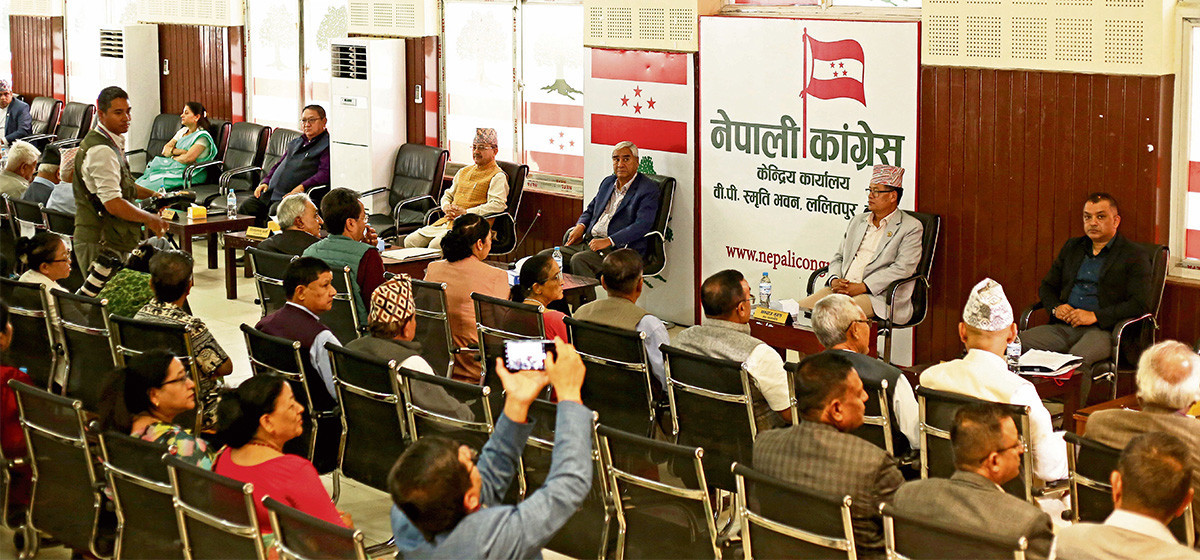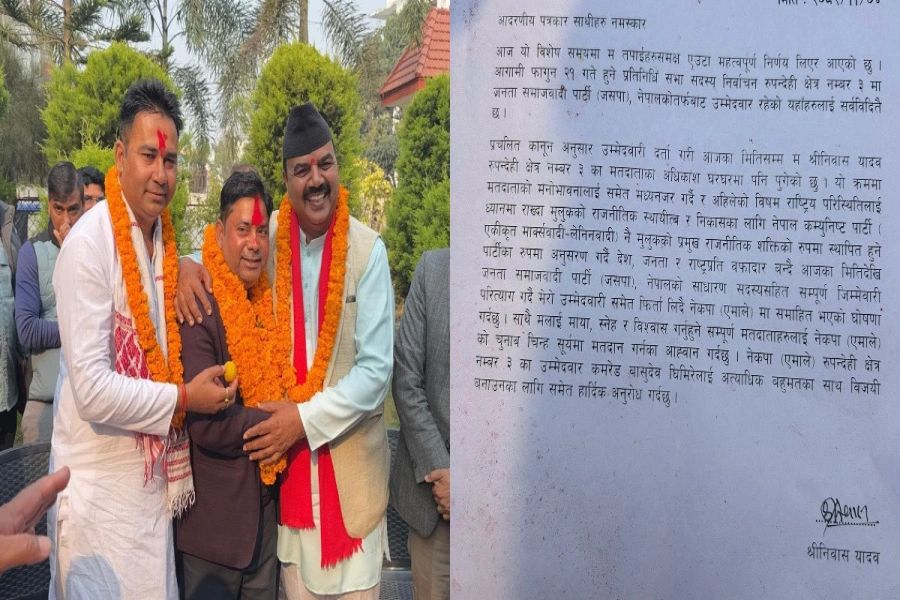KATHMANDU, July 5: The Central Working Committee (CWC) meeting of the ruling Nepali Congress (NC) has been ongoing at the party’s central office in Sanepa since Monday. As the prolonged meeting has reportedly disrupted the functioning of both the parliament and the government, there are preparations to conclude it by Sunday.
Many had expected the meeting—convened after 10 months—to include a serious review of the one-year tenure of the KP Sharma Oli-led government, which was formed with the party’s support. Leaders have also stated that the meeting will center on how the seven-point agreement, which includes a constitutional amendment, is being implemented..
Many had expected that the meeting would address public dissatisfaction with the constitution and issues seen in the government’s performance, with the NC presenting a concrete stance along with a proposal for constitutional amendment. However, judging by the meeting up to Friday, the chances of the party putting forward a clear position on the government, the seven-point agreement between the two parties, and constitutional amendment appear increasingly slim.
Most of the central committee members who have spoken so far have focused on topics beyond these issues. Matters of national and public interest do not seem to be a priority for the members. The meeting has also failed to pay attention to how growing public frustration can be addressed.
Although there has been a change in the political system, the condition of the people remains the same. This has led to growing frustration among citizens. To overcome this frustration, the government must work more effectively and ensure that people can genuinely feel the impact of change. It must strongly commit itself to good governance. However, according to members, these issues have also not received much attention in the meeting.
Oli, Dahal to meet again on Tuesday as they differ whether to c...

Some political parties and groups have engaged in anti-system activities, fueled by growing public dissatisfaction. However, this issue has not been raised in the NC meeting either. Every day, young people are leaving the country—many of them expressing frustration and blaming the government and political parties. The government and political parties have failed to instil hope or confidence among the youth that there is a future for them within the country. The government formed by the two major and long-established parties has also failed to live up to expectations, further intensifying disillusionment among the younger generation.
Many had expected the ongoing NC meeting to produce decisions that would connect both the government and the party with the new generation. However, the tone and manner of the meeting suggest that there has been little attention paid to attracting young people while also preserving the party’s older base. Rather than focusing on the nation, the people, and the party, the discussions have largely revolved around personal interests. The leaders appear more concerned with breaking existing factions and strengthening their own camps than with engaging the youth or addressing broader issues.
Senior leaders of the party are gradually becoming inactive in politics. However, the Nepali NC has failed to connect with the younger generation. In the upcoming 2027 general elections, new voters will play a decisive role. Yet, party leaders have not paid attention to how to engage with the youth or how to energize the party by holding general conventions of sister organizations, including the Nepal Students' Union (NSU). Instead, their focus seems to be on trimming and expanding the list of active members. Many of these active members neither voted for the party’s candidates in the past nor are likely to do so in the future.
However, active members play a crucial role, from the ward level to central leadership selection. According to party leaders, these members vote in internal party elections. This is why the focus of NC leaders is currently on creating and removing active memberships.
The committee formed under the coordination of the general secretary to oversee the distribution and renewal of active memberships has not been able to renew memberships in even half a dozen districts so far. Instead, the NC leaders are seen working separately in different locations, preoccupied with calculating how many members have been added or are to be added to their faction and how many have been removed or are to be removed.
Leaders engaged in the campaign to increase party membership have shown little interest in fulfilling the responsibilities and building the structures that should be formed between one general convention and the next, as mandated by the party statute. According to the statute, the CWC supposed to meet every two months, yet it convened only after ten months. Even then, the meeting has shown little concern for issues of public interest or party organization.
Except for a few exceptions, none of the district-level structures are functional. Due to factional disputes, district committees are not even in a position to hold meetings. In an effort to resolve these disputes and revitalize the organization, the NC had decided to deploy central committee members to the districts. However, that initiative failed to be as effective and result-oriented as expected. There appears to be little to no interest in resolving district-level disputes or in making the organization active and functional.
The NC, which selected leadership without a policy at its 14th general convention, held a CWC in March 2024. Although the proposals passed in that meeting were approved by the CWC, they have not been implemented. Even CWC members are unaware of the details regarding this matter.
The meeting showed concern and apprehension regarding the date of the 15th general convention. However, rather than focusing on conducting the convention according to rules and procedures, the leaders appeared more preoccupied with how to secure leadership positions for themselves.
Given the domestic and international situation, there is a need for the NC to develop clear positions and strategies regarding their potential impact on the country's economic, political, social, and diplomatic sectors. However, disregarding this necessity, the CWC has been focused mainly on personal accusations and counter accusations.
The meeting is increasingly becoming a platform for airing personal grievances rather than seeking ways to steer national politics in the right direction or formulating policies and strategies that can help the party face challenges. There is a growing analysis that the meeting, which should deliberate necessary policies and decisions to provide the country with solutions and development as widely expected from the NC, is being limited to mere formality.
CWC members Gyanendra Bahadur Karki, Dilendra Prasad Badu, Dipak Giri, Sujata Pariyar, Kalyankumar Gurung, Sarita Prasai, Amrit Aryal, Kalpana Chaudhary, Kiranraj Sharma Paudel, Gehendra Giri, Taraman Gurung, Rajiv Koirala, Umesh Jung Rayamajhi, Abdul Satar, Rajiv Dhungana, Ramhari Khatiwada, Anjani Shrestha, Champadevi Khadka, Muktakumari Yadav, Pratima Gautam, Govindraj Pokhrel, Sushila Mishra Bhatt, Gangalaxmi Awal, Sushila Thing, Sushila Dhakal (Acharya), Shanti Pariyar BK, Jeevan Rana, Dhana Khatiwada, Gomakumari Bhattarai, Anil Kumar Rungata, invited central member Dipak Khadka, and invited ministers Tejullal Chaudhary (Youth and Sports) and Ramnath Adhikari (Agriculture and Livestock Development) have expressed their views. The next CWC meeting will be held on Sunday.



































